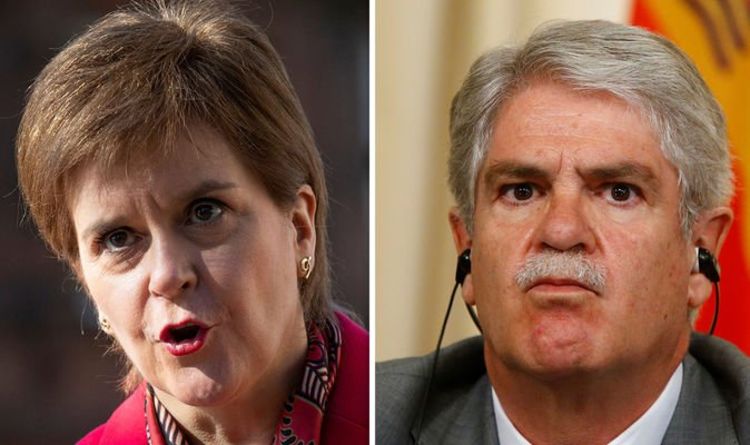Nicola Sturgeon's coronavirus strategy 'backfired' says McCrae
We use your sign-up to provide content in ways you’ve consented to and to improve our understanding of you. This may include adverts from us and 3rd parties based on our understanding. You can unsubscribe at any time. More info
The Scottish National Party (SNP) and Scottish Greens won a total of 72 seats in Holyrood on a record turnout for the Scottish Parliament elections of 63 percent – 10 percent higher than on average for a Scottish Parliament election. The election victory is an urgent issue for one union – the UK – but it may also pose important questions down the line for another: the EU. Both parties stood on a platform of an independent Scotland joining the bloc.
However, Scottish First Minister Nicola Sturgeon would have to overcome many hurdles before she could secure membership.
After winning Indyref2, Scotland would need to apply to join the bloc again under Article 49 of the Treaty of the European Union.
New members can only be allowed into the bloc through an unanimous vote from the existing member states and an independent Scotland would undoubtedly ruffle feathers.
Spain is struggling with secession demands itself, from Catalonia, so many believe it is unlikely to support a newly independent state.

Over the years Spanish politicians have indeed shown opposition when it came to Scottish independence.
In 2017, as Ms Sturgeon was trying to leave the UK and automatically join the EU, Spain’s former Foreign Minister Alfonso Dastis delivered a brutal warning.
He said: “If by mutual agreement and by virtue of constitutional change Scotland ended up being independent, our thesis is that it could not stay inside the European Union.
“It would have to join the queue, meet the requirements, go through the recognised negotiating system and the end result will be whatever those negotiations produce.”
Four years before, ahead of the Scottish independence referendum in 2014, the ex-Spanish leader Mariano Rajoy also told his government that he believed an independent Scotland could only apply to join the EU from outside the organisation as a new state, as he warned against regions of Europe embarking on “solo adventures in an uncertain future”.
JUST IN: EU’s accession to CPTPP branded ‘impossible’


While Mr Rajoy’s government was facing an election in late 2013, before Scotland formally sought to become independent, the Spanish politician’s words were seen as an effective veto on immediate Scottish entry to the EU.
Speaking at a joint press conference with former French President François Hollande, Mr Rajoy said: “It’s very clear to me, as it is for everybody else in the world, that a country that would obtain independence from the EU would remain out of the EU, and that is good for Scottish citizens to know and for all EU citizens to know.”
Mr Rajoy said EU treaties “apply only to member states that have agreed and ratified them, and if a part of one member state cleaves from the member state, it converts itself into a third party with relation to the EU”.
He added: “That is the law and that law applies.
“In no way does it benefit our European regions and our citizens to propose divisions or solo adventures in an uncertain future in which the exit points may seem clear but the destination is unknown.”
DON’T MISS:
John Major’s secret plan to save Royal Family [REVEALED]
SNP called for referendum on EU treaty before Brexit [INSIGHT]
London’s ‘major win’ after ECJ ruled ECB ‘lacked competence’ [ANALYSIS]


In an exclusive interview with Express.co.uk, Mar Aguilera Vaqués, professor of constitutional law at the University of Barcelona, argued that if Scotland becomes independent, it would be treated in the same way as Kosovo by the Spanish government.
She explained: “We had a football match. Spain against Kosovo and there was the biggest scandal.
“On Spanish television they wrote Kosovo in lower case because Spain doesn’t recognise its independence.”
Ms Aquilera Vaqués added: “I guess it would be the same for Scotland for sure…
“They don’t want to replicate what is happening here with Catalonia.”
Catalonia is one of Spain’s wealthiest and most productive regions and has a distinct history dating back almost 1,000 years.
Its desire for independence stretches back decades.
Three years since its government’s failed attempt to unilaterally declare independence, Catalonia has somewhat disappeared from international headlines.
However, while its institutions are unlikely to pose any serious new threats to Spain’s stability, the political situation in the autonomous region is far from normalised.
Several pro-independence politicians are currently in jail or in exile, violent protests regularly break out in the streets, and the ‘war of flags’ continues on the balconies of Catalonia’s towns and cities.
Source: Read Full Article
